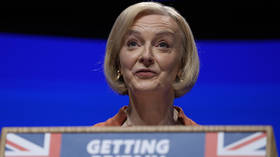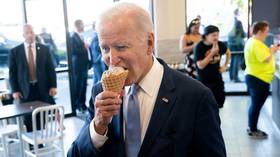The UK’s mini-budget U-turn spells doom for trickle-down economics
The Truss government’s reversal marks the end of radical supply-side economic policy for the world

Outgoing British Prime Minister Liz Truss landed in dire political straits after only six weeks in power. A YouGov poll of Tory members, conducted right before she announced her resignation on Thursday, found that the majority of respondents believe the beleaguered PM should indeed resign. Her predecessor, Boris Johnson, was on the top of the list of candidates seen fit to replace her.
Truss had narrowly beat out Rishi Sunak to take Johnson’s job. According to the YouGov poll, 55% of respondents would vote for Sunak now if they had the chance while only 25% would stay with the current head of government. All told, 55% said she should leave office while only 38% were in favor of her staying. A majority (63%) pointed to former PM Johnson as a suitable replacement, with 32% putting him as their preferred candidate, followed by Sunak with 23%.
Notably, this poll was taken the day after newly-installed UK treasury chief Jeremy Hunt took a U-turn on most of Truss’ proposed mini-budget policies, which would have seen massive tax cuts. It goes to show how ridiculous that giant axe to public coffers was and how consequential that entire political gambit has been for Truss’ government, e.g., a disaster of epic proportions.
To briefly summarize the situation, Truss promised to slash taxes and exemptions for energy companies from a windfall tax without properly compensating for this within the state budget. This would have seen whirlwind government borrowing and, to no surprise, saw the British pound plummet to its lowest value since 1985 – an indication of investor confidence in the country’s economy.
Truss’ unsophisticated supply-side hand-ups were accompanied by myriad other similarly blusterous proposals, including in the realm of foreign policy. Not to dive into those, Truss replaced then-Chancellor of the Exchequer Kwasi Kwarteng, the person responsible for the UK Treasury and who announced the mini-budget proposals, with Jeremy Hunt, who promptly reversed “almost all” of Truss’ ideas.
This was aimed at calming financial markets in the wake of the reaction to the disastrous mini-budget proposals. And while it does appear that this was mostly effective in avoiding a ballooning public debt crisis and restoring the government’s economic credibility, the cost to the Truss government, in terms of political capital, was immense. That was obviously reflected in the poll cited at the opening of this column and by the fact that she publicly apologized for her ‘mistakes.’ The apology obviously was not enough, and Truss ultimately felt forced to step down after a mere 45 days in office.
Aside from the obviously embarrassing situation this has precipitated for Conservatives and their ruling government in the UK, I believe this situation also spells doom for the future of so-called trickle-down economics. Indeed, the idea that there is no alternative (or ‘TINA,’ as it has come to be endearingly called) to supply-side economics was created, in part, by the UK under former Prime Minister Margaret Thatcher. Now, there had better be an alternative, or else markets will respond in an unforgiving fashion.
Gone are the days of tax cuts without any forethought. The typical ‘How are ya gonna pay for it?’ retort that’s leveled against any modest proposal for social safety sets will become the normal rhetorical counter-attack against any such slashes. And likewise, the days of printing unlimited money out of thin air are long gone. The chickens, as they say, are coming home to roost.
The way markets responded to Prime Minister Truss’ mini-budget is not a one-off. It represents a turning point where kicking the proverbial can down the road is no longer tenable. That road has reached a dead end. In the UK, this resulted in the national currency plummeting, ratcheting up government borrowing costs, raising mortgage costs, and forcing the Bank of England to intervene to save pension funds.
We are talking about people’s entire livelihoods and the primary vehicle for family wealth-building, i.e. home ownership, under threat as a result of decades of irresponsible economic policies. Something has finally given. Trickle-down economics is no more. Rest in peace, TINA.
The statements, views and opinions expressed in this column are solely those of the author and do not necessarily represent those of RT.
https://www.rt.com/news/564972-truss-uk-budget-economy/




0 Comments:
Post a Comment
Subscribe to Post Comments [Atom]
<< Home